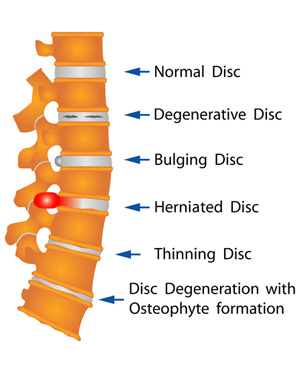
Potential Causes
As our bodies age, so do the discs in our backs. Some people can age without noticing many pain symptoms, while others are not so fortunate and start to feel persistent lower back or neck pain. Those most commonly affected are between the age of 30-60 year, since once a fully degenerated disc no longer has any inflammatory proteins that can cause pain, the disc enters into a stable position. As a result, discogenic pain rarely occurs in most people over the age of 60.
How & Why Does Discogenic Back Pain Develop?
Degenerative disc disease can develop over time as discs located between the vertebrae of the spine become more susceptible to inflammation. Discogenic pain occurs as the condition of the discs in the spine changes over time. When pain occurs, it may be spontaneous or it may result from an activity.
Symptoms
The most frequent symptoms of discogenic pain are lower back pain and back spasms, and are typically worsened by bending, sitting, or standing in a stationary position. Lying down and light exercise can provide some relief.
Diagnosis
Accurate diagnosis of the source of pain is important to successfully treat Discogenic Back Pain. If you are experiencing symptoms similar to discogenic pain, Orlando Pain & Spine Center can provide you with a diagnosis, which begins with:
• Thorough clinical evaluation
• Complete medical history, analysis of your symptoms, and physical examination
• Additional testing, such as MRIs, X-rays, CT scans, or EMG
• provocative Discogram, provide in certain conditions, the problematic disc that cause your pain.
